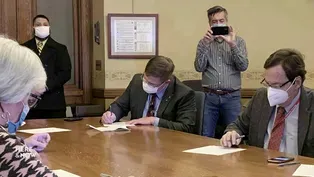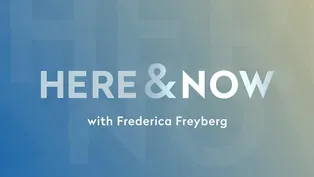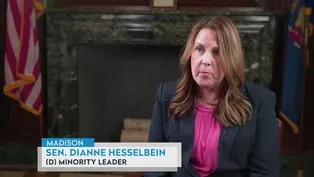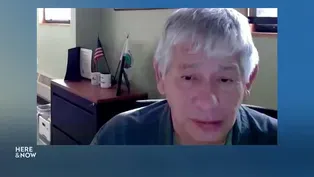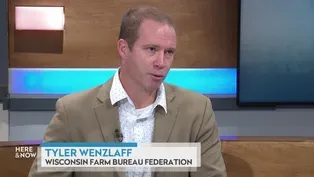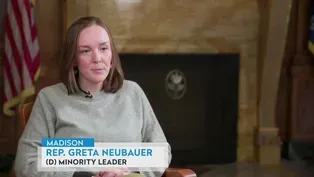Here and Now
Chancellor Michael Alexander on the Finances of UW-Green Bay
Clip: Season 2300 Episode 2323 | 6mVideo has Closed Captions
Michael Alexander on growing enrollment and eliminating a budget deficit at UW-Green Bay.
University of Wisconsin-Green Bay Chancellor Michael Alexander discusses growing enrollment, cutting majors and eliminating a budget deficit while ending in-person classes at its Marinette campus.
Problems with Closed Captions? Closed Captioning Feedback
Problems with Closed Captions? Closed Captioning Feedback
Here and Now is a local public television program presented by PBS Wisconsin
Here and Now
Chancellor Michael Alexander on the Finances of UW-Green Bay
Clip: Season 2300 Episode 2323 | 6mVideo has Closed Captions
University of Wisconsin-Green Bay Chancellor Michael Alexander discusses growing enrollment, cutting majors and eliminating a budget deficit while ending in-person classes at its Marinette campus.
Problems with Closed Captions? Closed Captioning Feedback
How to Watch Here and Now
Here and Now is available to stream on pbs.org and the free PBS App, available on iPhone, Apple TV, Android TV, Android smartphones, Amazon Fire TV, Amazon Fire Tablet, Roku, Samsung Smart TV, and Vizio.
Providing Support for PBS.org
Learn Moreabout PBS online sponsorship>> Yeah.
Tyler Wenzlaff, thanks >> Yeah.
Thank you.
>> UW schools separate from the flagship in Madison, mostly see falling enrollment and budget woes.
As a result, some branch campuses have been closed altogether, resulting in layoffs.
Some majors have been eliminated, and there has been belt tightening all around.
The UW administration is asking the legislature for $855 million in the next two year budget to shore up the system.
That's expected to be a fight with Republican legislators.
Amidst all of this, though, a bright spot, UW green Bay this fall saw record high enrollment of 7000 full time students and eliminated its deficit last year.
How did they do it?
We turn to UW green Bay Chancellor Michael Alexander.
Ahead of that, we should note PBS Wisconsin is part of UW-Madison.
And Chancellor, thanks very much for being here.
>> Thanks very much for having me.
>> So that big question is how did you boost enrollment to these levels?
>> Well, I think we're really trying to redefine how we view who a student could be.
So we really view a student as anyone who wants to learn.
And we feel that as a regional comprehensive, we should be of value to every citizen in northeast Wisconsin, whether they be, you know, all the way from pre-K, all the way through retirement, right, that there should be some way that the this regional comprehensive we are serving people who want to continue their education.
So we work everything from a lot of college credit in high school.
Our dual enrollment with students, obviously, we have traditional students who come live on campus.
We have a ton of commuters.
We have a ton of people who are in the workforce who come with us, and we teach over 85,000 people a year in Noncredit work to help them advance their careers and their lives.
>> So do you feel as though UW green Bay has is starting to become known as a place where people in different stages of their life can go and get that degree?
>> I hope so, I think we are doing everything we can to make sure that we are viewing education through the eyes of a student.
In other words, what makes it convenient for a student to advance their life through education as opposed to just thinking about what may be convenient for us?
So we're adapting the university as fast as we can to live in that reality.
In the modern world, where people have complicated lives and we need to meet them where they are to make sure they can have education, be a part of it.
campuses will be using yours as a model?
Example?
>> I don't know, but I know that every campus in the UW system is doing really amazing work, and all of us have very different circumstances based on location and all the different things.
I think I'm really, really proud to have amazing colleagues across the system that are doing an amazing job educating students.
>> At the same time, your Marinette branch campus closed in-person classes and UW green Bay eliminated some majors, including theater.
What do you say to people who say campuses are now just trying to kind of turn out industry specific workers rather than focus on college attainment in the liberal arts for its own sake?
>> Well, I think that's a really great question.
I think that we believe very strongly that the reason you come to a university is because you're going to learn more than just a skill for, for a job.
You're going to learn skills that will help you throughout your life and your career.
That has to be skills that you learn through the liberal arts, like communication, like understanding how to how to talk to people who have differing ideas than you do.
So important in the modern world, and learning through things like theater.
So we are looking very carefully about how to make sure we can get more students who take things like theater.
It doesn't mean we have to have a major in it.
We believe, though, that those liberal arts classes are core to who we are, and Marinette is a great example of this.
Marinette we have a technical college that's right next door to us in Marinette, and we still have options for education in Marinette for students who need the university for an access point to their classes.
But we've really invested in the theater.
There, and the theater in Marinette now is thriving.
It's sold out performances.
It has really grown under UW green Bay, and we're really proud of that.
It's I think we have to look at education differently and we view Marinette broadly as a success, even though we don't have in-person classes anymore.
>> So you had to spend down your reserves, I understand, to get rid of the deficit.
How much does UW green Bay need an infusion of state dollars to keep going, even with your enrollment success?
>> I think it's really important that the state look at how it's investing in education to make sure that we're preparing the workforce.
We need for the future.
And if you look at this, and if you look, there's a Georgetown study that talked about this, about what good jobs will look like.
And by good jobs, it's not white collar, blue collar.
I'm talking about.
It's just jobs that are going to be able to pay well and more and more of those as we look into the next decade, are going to require education beyond high school.
And it's certainly possible to have a rewarding career and not have any experience beyond high school.
It's just the odds of having a high paying job are less right.
And so how do we make sure that we're putting people and allowing people to evolve in the workforce?
As the workforce skills you need change so quickly in the current age, if you think about even AI and what kind of skills we will need in the future, this is really important.
>> All right.
Chancellor Michael
Criminal Charges in 2020 False Electors Scheme Proceed
Video has Closed Captions
Charges in the 2020 false Trump electors case in Wisconsin are proceeding in court. (1m 28s)
Here & Now opening for December 13, 2024
Video has Closed Captions
The introduction to the December 13, 2024 episode of Here & Now. (55s)
Sen. Dianne Hesselbein on Wisconsin Politics Going Into 2025
Video has Closed Captions
Dianne Hesselbein on the Democratic caucus, election results and state budget process. (4m 42s)
Tribe and Environmental Groups Offer New Line 5 Challenges
Video has Closed Captions
The Bad River Tribe and environmental groups challenge the Enbridge oil pipeline reroute. (55s)
Tyler Wenzlaff on the Politics of Extending the Farm Bill
Video has Closed Captions
Tyler Wenzlaff on an extension to the 2018 Farm Bill and impacts on farmers and families. (6m 2s)
Rep. Greta Neubauer on Wisconsin Politics Going Into 2025
Video has Closed Captions
Greta Neubauer on impacts of redistricting, new Democratic lawmakers and the state budget. (6m 8s)
Providing Support for PBS.org
Learn Moreabout PBS online sponsorshipHere and Now is a local public television program presented by PBS Wisconsin
